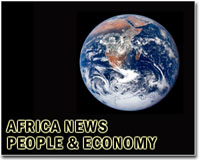| . |  |
. |
Kinshasa, Democratic Republic Of Congo (UPI) Sep 8, 2010 While African warlords and their shady business partners fight over the vast mineral riches of the Democratic Republic of Congo, another battle, over a huge copper mine, is escalating between a Canadian company and the government. The dispute between the Kinshasa regime and First Quantum, a Toronto copper miner, is now before international arbitration. The outcome could have a significant impact on future foreign investment in the DRC, which has been ravaged by war since 1994 in which the big prize is its mineral wealth. "Large mining companies have eyed Congo's mineral wealth for years but have refrained from investing until pioneers such as First Quantum proved that their licenses were secure," the Financial Times commented. "First Quantum now seems to have been systematically stripped of all its assets in the country, even as it disputes these alleged 'expropriations' through an international court in Paris." First Quantum shut down its Kolwezi mine, one of the largest in the Congo, in September 2009 on orders from Kinshasa, which cited contract violations and other unspecified misconduct. The company closed its other copper mine, Frontier, Aug. 30, again on government orders. It claims Kinshasa had seized its mines, without cause or compensation, then sold them to other companies. One of these is owned by Israeli entrepreneur Dan Gertler, who has close links to the family of DRC President Joseph Kabila. In late August, his holding company sold a majority stake in the Kolwezi mine to the Eurasian National Resources Corp., a London-listed Kazakh mining outfit, for $175 million, even though the issue of ownership of the mine is now before an arbitration court. First Quantum is expected to take legal action against ENRC, the FT reported. "Anger is growing among London's investor community over the decision by an FTSE 100 miner to buy a disputed copper project in the DRC," it noted. The dispute goes beyond the DRC's borders, across all of central Africa where discoveries of large mineral deposits are being eyed by big-ticket investors. "Cameroon is expected to attract $10 billion over the next few years to develop some of the most promising new mineral reserves in the region, while Equatorial Africa is pushing infrastructure development," noted Hannah Koep, senior Africa analyst at Control Risks, a London business risk consultancy. "Elsewhere, BHP Billiton announced the discovery of an estimated 60 million tons of manganese in southeastern Gabon, while France's Areva is drawing up plans to build a large mine in the Central African Republic to exploit uranium deposits." There have always been considerable risks when it comes to major investments in Africa, particularly in countries ruled by dictators and tyrants who systematically plunder national assets. "Corruption is rampant and most companies are often forced to work with government-picked partners, over whom control is severely limited," Koep observed. Some of these partners are state-controlled companies, often run by members of the ruling elites. In the West African state of Ghana, for instance, Exxon Mobil is reported to have abandoned efforts to acquire the vast Jubilee oil field offshore for $4 billion from Kosmos, a U.S. exploration company, because the Accra government wants to take it over. Ghanaian officials insist Kosmos violated its contract and that state-run Ghana National Petroleum Corp. has the exclusive right to buy Kosmos' stake. Kosmos denies that. Ghana, a former British colony, is considered to be one of the more stable states in Africa after successfully making the transition to democracy with five general elections that were deemed to be above board. But, with its new-found oil wealth -- $1 billion a year at current estimates -- there are fears Ghana will fall victim to the "resource curse" of vast revenues that don't filter down to largely impoverished populations. Jennifer Cooke, director of the Africa Program at Washington's Center for Strategic and International Studies, said Ghanaians are concerned about "continued corruption." She said "very few oil-producing countries in Africa have really solid democracies." New leaders are emerging in Africa but Koep notes "it remains questionable the region's new faces can end the old patterns of mismanagement and abuse Prospects for comprehensive reform remain limited, given the history of poor accounting and transparency standards."
Share This Article With Planet Earth
Related Links Africa News - Resources, Health, Food
 Nigeria leader replaces military, security heads: presidency
Nigeria leader replaces military, security heads: presidencyAbuja (AFP) Sept 8, 2010 Nigerian President Goodluck Jonathan has appointed new military, intelligence and police chiefs, his office said on Wednesday, ahead of January elections in the oil-rich country. Jonathan, who took over after the death of president Umaru Yar'Adua in May, did not provide specific details on the reason for the moves announced a day after the country set January 22 as the date for its president ... read more |
|
| The content herein, unless otherwise known to be public domain, are Copyright 1995-2010 - SpaceDaily. AFP and UPI Wire Stories are copyright Agence France-Presse and United Press International. ESA Portal Reports are copyright European Space Agency. All NASA sourced material is public domain. Additional copyrights may apply in whole or part to other bona fide parties. Advertising does not imply endorsement,agreement or approval of any opinions, statements or information provided by SpaceDaily on any Web page published or hosted by SpaceDaily. Privacy Statement |